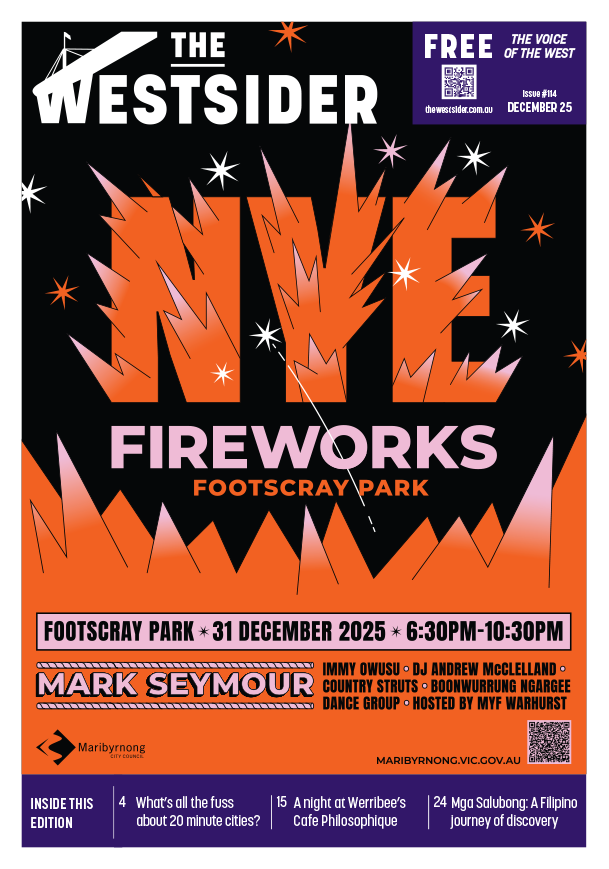Are you a member of a political party, political group, or community advocacy group? (eg; Labor, Liberal, Greens, Socialist, My Place, Angry Victorians, Better West, environment groups, etc)
No
What is the most important issue facing your electorate?
Rapid urban growth and expansion in Wyndham have brought various environmental challenges, such as increasing traffic congestion, rising waste levels, and the impacts of a changing climate. Wyndham’s efforts to promote a sustainable city are broad and diverse, addressing the many aspects of its environment and evolving needs.
Should/how can Council support local businesses?
Local councils can support businesses by;
- Offering grants and financial assistance.
- Providing training and business development workshops.
- Hosting networking events to foster collaboration.
- Running buy local campaigns to promote local commerce.
- Simplifying regulations for easier business operations.
- Offering advisory services for expert business guidance.
- Improving infrastructure to attract customers.
- Supporting digital presence and e-commerce.
- Providing affordable co-working spaces.
- Advocating for local businesses with higher authorities.
- Supporting community events to increase engagement.
- Encouraging startups and innovation through incubators.
These actions help businesses thrive and boost the local economy.
Should/how can Council support local creatives and industries?
Councils play a pivotal role in fostering local creativity and supporting industries. Here are several ways they can help:
- Offer grants and financial support to local creatives and industries
- Develop creative hubs and affordable workspaces
- Organize events to showcase local talent
- Fund public art projects like murals and sculptures
- Provide training and business development resources
- Promote local artists through council platforms
- Encourage collaborations between creatives and local businesses
- Support creative tourism to boost visibility
- Advocate for policies that protect and nurture creative industries
Should/how can Council help alleviate the impact of climate extremes on local communities and ecosystems?
Councils can help mitigate climate extremes by;
- Greening Cities: Planting trees and creating parks to reduce heat and improve air quality.
- Water Management: Implementing rainwater systems and flood defenses to manage droughts and floods.
- Resilient Infrastructure: Upgrading roads and public facilities to withstand extreme weather.
- Public Education: Running campaigns to raise awareness about climate adaptation and energy efficiency.
- Renewable Energy: Promoting solar, wind power, and energy-efficient practices.
- Protecting Ecosystems: Preserving natural habitats and biodiversity to build ecological resilience.
- Emergency Planning: Strengthening disaster response and early warning systems.
These efforts create stronger, more adaptable communities and ecosystems.
Should/how can Council help alleviate cost of living and homelessness?
I feel, to address the challenges of cost of living and homelessness, local councils can play a pivotal role by implementing strategic measures that focus on immediate relief and long-term sustainability. Here’s how councils can help;
- Affordable Housing: Partner with developers to build affordable housing; use council-owned land for social housing.
- Rental Assistance: Provide rental subsidies and bond assistance to prevent homelessness.
- Support Shelters: Increase funding for homeless shelters, outreach programs, and essential services like food and job training.
- Expand Social Services: Offer financial counseling, employment assistance, and health services.
- Transport Subsidies: Reduce the cost of public transport or offer free passes for low-income residents.
- Job Creation: Invest in local businesses and community projects to create jobs.
- Food Programs: Support food banks, community gardens, and subsidized grocery programs.
- Advocacy: Work with higher levels of government to push for policies that address housing affordability and economic support.
What should Council stop spending money on?
I feel, to improve fiscal responsibility and maximize community benefit, the Council should consider stopping expenditure on:
- Outdated Programs: Cease funding for programs that no longer align with current community needs or priorities.
- Inefficient Processes: Eliminate spending on administrative practices that are outdated or redundant and invest in more efficient solutions.
- Non-Essential Aesthetics: Halt expenditure on aesthetic improvements that do not enhance functionality or provide significant community value.
- Underperforming Projects: Review and terminate projects that consistently underperform or fail to achieve their intended outcomes.
- Duplicative Services: Stop funding for services that duplicate efforts of other local organizations, ensuring that resources are used where they are most effective.
- Unnecessary Travel and Conferences: Cut back on travel and conference costs that do not directly contribute to actionable benefits or strategic goals.
- High-Cost Consultants: Reduce reliance on expensive external consultants by developing internal expertise or using more cost-effective solutions.
Should the public be allowed to ask live, unscripted questions of councillors during council meetings?
I feel, allowing the public to ask live, unscripted questions of councillors during council meetings can be beneficial for several reasons:
- Transparency: It promotes openness and allows the public to directly address their concerns and receive immediate responses, enhancing trust in the council.
- Engagement: It encourages community involvement and makes people feel more connected to local governance, increasing civic engagement.
- Accountability: Councillors are held more accountable for their actions and decisions when they have to respond to unscripted questions.
- Immediate Feedback: It provides councillors with real-time feedback on public concerns and opinions, which can be valuable for shaping policies and decisions.
However, there are also some challenges as highlighted below:
- Preparation: Councillors may not always be prepared for unscripted questions, which can lead to incomplete or inaccurate responses.
- Disruption: Live, unscripted questions can potentially disrupt the flow of the meeting and lead to unproductive exchanges if not managed properly.
- Control: There needs to be a mechanism to ensure that questions are relevant and respectful to maintain a constructive environment.
In summary, while there are potential drawbacks, the benefits of increased transparency, engagement, and accountability often outweigh the challenges, making it a worthwhile practice if managed effectively.
Can you please provide a short personal statement detailing what your priorities are if elected, and what your vision for your electorate looks like.
My vision is to build a lively, inclusive community that thrives on diversity, where everyone feels a sense of belonging. Through vibrant multicultural events and innovative sporting initiatives, I aim to make our municipality a beacon of creativity and collaboration. By bringing together businesses, non- for-profits, and residents, we can create opportunities for growth, support, and shared success all while addressing the key challenges that impact our community’s well-being.
My commitment is to drive initiatives that not only address immediate needs but also foster long-term growth and engagement. By championing programs that enhance cultural, sporting, and personal development, I will work tirelessly to ensure that our community is a place where creativity flourishes and every voice is heard.
I want to create a community where we celebrate our diversity, embrace new challenges, and work together to achieve our shared vision for a brighter future.



